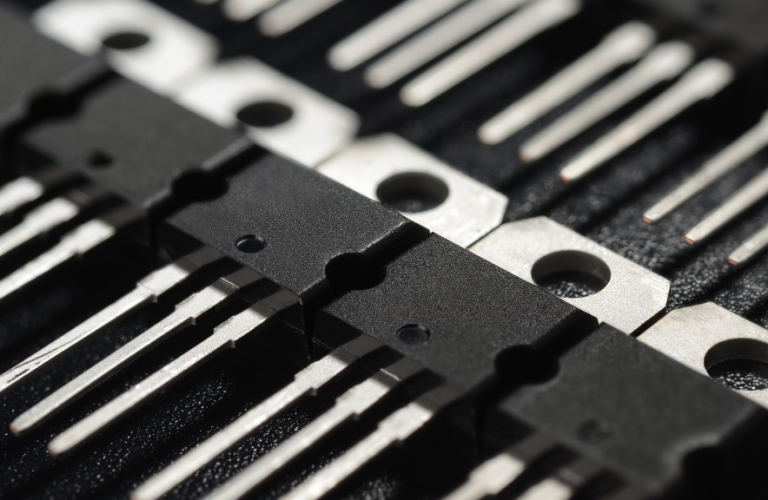What Do Transistors Do? Learn More!

More from the Category
A transistor is a device used to regulate the flow of electrical signals. The basic role of transistors is to control or amplify electrical signals, which makes them an essential component of nearly every modern electronic device.
Who Invented the Transistor?
The invention of the transistor is one of the most important technological breakthroughs in history. The technology was developed at Bell Labs by John Bardeen, Walter Brattain, and William Shockley, and Bardeen and Brattain constructed the first functional transistor in 1947. The trio’s work revolutionized electronics and earned them the Nobel Prize in Physics in 1956.
Before transistors, devices like vacuum tubes were used to amplify electrical signals, but they were large, power-hungry, and prone to failure. Transistors solved these issues by being more reliable, smaller, and energy-efficient.
What Do Transistors Do?
Transistors are made from semiconductor materials like silicon, which can act as a conductor or an insulator depending on changes in the electrical current applied. This flexibility allows transistors to perform two key functions:
Switching
A transistor can act as a switch, controlling whether current flows through a circuit. In digital electronics, transistors switch between on (1) and off (0) states, allowing them to represent binary data. This simple mechanism is the foundation of all digital processing. A computer’s processor uses billions of transistors, turning on and off in rapid succession to process data and execute instructions.
Amplification
Transistors also can accept weak electrical signals and strengthen their output, which is especially important in analog electronics. For example, in audio devices, a small input signal can be amplified to drive speakers, enhancing the volume without distorting the sound. This ability to boost signals is why transistors are integral to devices ranging from hearing aids to televisions.
Interested in other electronic components and what they do? Check out this deep dive.
How Do Transistors Work?

Transistors operate using three terminals: the emitter, collector, and base. The base acts like a gate that controls the flow of current between the collector and emitter. When a small current is applied to the base, it allows a much larger current to flow from the collector to the emitter, amplifying the input signal in the process. While all transistors perform similar functions, there are various types depending on the specific needs of a circuit.
There are two primary types of transistors:
Bipolar Junction Transistor (BJT)
This type of transistor has two junctions between different kinds of semiconductor material. It operates by injecting electrons and holes between the base and the collector/emitter terminals. There are also two polarities of BJTs. In NPN transistors, the current flows from the collector to the emitter when a positive voltage is applied to the base. In PNP transistors, the opposite occurs, and a negative voltage at the base allows current to flow.
Field-Effect Transistor (FET)
This type of transistor uses an electric field to control the flow of current. The most widely used type of FET is the Metal-Oxide-Semiconductor Field-Effect Transistor (MOSFET), which is widely used in microprocessors and digital circuits because they are more power efficient. MOSFETs come in two flavors: N-channel and P-channel, and they rely on positive or negative voltage applied to the gate (analogous to the base in BJTs) to control current flow.
Why Transistors Are So Important

Transistors are the foundation of modern computing because they are the key component in logic gates, which are, in turn, the building blocks of integrated circuits (ICs). And integrated circuits are found in virtually all modern electronics. ICs pack millions or billions of transistors onto a small chip, and these chips can perform complex tasks, from basic arithmetic to advanced computations that power artificial intelligence. The more transistors on a chip, the more processing power that chip has.
The ability to fit more transistors on a chip directly determines its processing power. Smaller transistors mean more can be packed into the same space, resulting in faster, more efficient chips.
The Role of Moore’s Law
The steady reduction in transistor size over the past decades has fueled Moore’s Law, the observation that the number of transistors on a chip doubles approximately every two years. This trend has led to exponential improvements in computing power, enabling the evolution from room-sized computers to smartphones and cloud computing systems.
While sustaining this pace is becoming challenging due to physical and economic limits, the principles of Moore’s Law continue to drive innovation in chip design and new computing architectures, ensuring that performance keeps improving.
Learn more about Moores Law here!
Every modern processor contains billions of transistors working in unison to handle calculations and manage data flow. Without transistors, we wouldn’t have computers, smartphones, or the internet. Beyond digital electronics, transistors are also essential for high-power systems, including solar panels, wind turbines, and electric vehicles, because of their ability to control electrical power flows efficiently.
The Impact of Transistors
Transistors may be small, but they are mighty, and their impact on the world is colossal. They power nearly every modern electronic device and are critical to the development of more efficient and powerful computing systems.
Just as transistors are the foundation of modern electronics, electronic components from Microchip USA are foundational to systems in a variety of industries, from medical and industrial systems to process automation and telecommunications. No matter what electronic components you’re looking for, our team of purchasing and supply specialists can get what you need — at the best price. Contact us today!